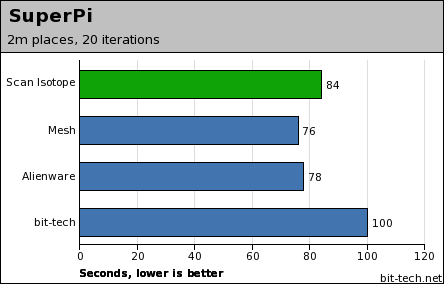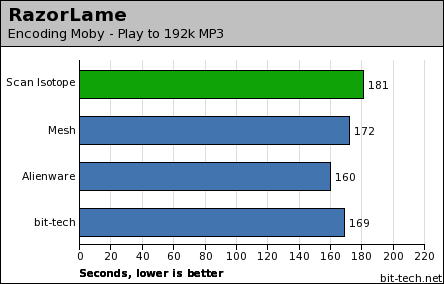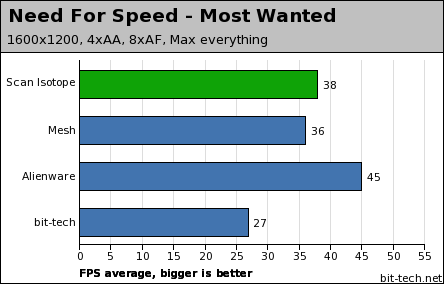Benchmarks
We put the Isotope up against some of the other systems we've reviewed recently. The
Mesh system from last month included an FX60 and a pair of 7800GTs. The ever-expensive
Alienware Aurora 7500 had the same FX60 but a pair of 512MB 7800GTXs. Our reference
bit-tech rig sports an X2 3800+ and a single 7800 GT.
The Sandra score is very telling here, and gives us an indication of why we might consider this system to be excellently built. The Alienware system we saw had 2GB of RAM but with four 512MB modules, meaning that they can only be run at a 2T timing. The Mesh sported fairly cheap memory, and our
bit-tech rig has 2GB, but configured with fairly standard timings. Scan has added in 2GB of fast XMS 4000 in just two modules and has configured the motherboard with aggressive timings - the difference shows.
Not surprisingly, the processor performance in the Isotope is slower than the FX60s in the Mesh and Alienware machines. However, proving that overclocking really does make a difference, the Isotope's overclocked 3800+ performs quicker than the stock in the
bit-tech rig.
The Isotope was strangely slow here. Razorlame is a great test of overall system speed, stressing the processor, I/O, motherboard and RAM. A little disappointing to be honest.
High Quality Gaming
We ran our standard list of gaming benchmarks across the 7900 GT system.
The 7900s in the Isotope expectedly beat the
bit-tech and Mesh systems, configured with 7800 GTs. In F.E.A.R. and NFS:MW, we see the extra frame buffer in the 7800 GTX cards the Alienware uses trump the extra speed of the 7900 GPU. Overall, the Scan is clearly a nippy system.














Want to comment? Please log in.